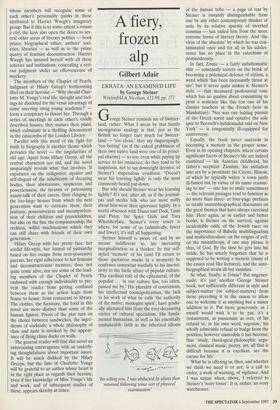A fiery, frozen alp
Gilbert Adair
ERRATA: AN EXAMINED LIFE by George Steiner Weidenfeld & Nicolson, £11.99, pp. 171 George Steiner reminds me of Switzer- land, rather. What I mean by that faintly incongruous analogy is that, just as the British no longer care much for Switzer- land — 'too clean,' they say disparagingly, `too boring' (as if the caked grubbiness of their own native land were one of its princi- pal charms) — so too, even while paying lip service to his eminence, do they tend to be suspicious, not to say downright derisive, of Steiner's stupendous erudition. 'Doesn't wear his learning lightly' is only the most commonly heard put-down.
But why should Steiner wear his learning lightly? It's not, after all, as if the journal- ists and media folk who are most sniffy about him wear their ignorance lightly. In a world obsessed with Diana and Dodi, Liam and Patsy, the Spice Girls and Tara Whatsherface, Steiner's ivory tower is where, for some of us (admittedly, fewer and fewer), it's still all happening.
Steiner himself is aware of, and by no means indifferent to, his increasing marginalisation as a thinker. In this self- styled 'memoir' of his (and I'll return to those quotation marks in a moment) he confesses somewhat wistfully to his insensi- tivity to the facile allure of popular culture. `The cardinal role of the ephemeral, of the populist ... in our culture has, too often, passed me by.' His plurality of convictions, his intellectual cosmopolitanism, the lack in his work of what he calls 'the authority of the native, monoglot spirit', have gradu- ally alienated him from the ever-decreasing circles of cultural specialism. His funda- mental humanism, as well as his essentially unshakeable faith in the inherited idioms 1m telling you, I was abducted by aliens then returned following some sort of physical examination' of the human tribe — a page of text by Steiner is instantly distinguishable from one by any other contemporary thinker of note by its relative sparsity of inverted commas — has exiled him from the more extreme forms of literary theory. And 'the virus of the absolute' by which he was con- taminated once and for all in his adoles- cence has no place in the catechism of postmodernity.
In fact, Errata — a fairly unfathomable title — constantly teeters on the brink of becoming a polemical defence of elitism, a word which 'has been incessantly thrust at me', but it never quite makes it. Steiner's style — that measured professorial tone which has no qualms about committing to print a sentence like this (on one of his classics teachers at the French lycee in Manhattan): 'Nor was our halting pursuit of the Greek aorist and optative the sole spur to Boorsch's hebdomadal raid on New York' — is congenitally ill-equipped for controversy.
Equally, the book never succeeds in becoming a memoir in the proper sense. Even in its opening chapters, where certain significant facets of Steiner's life are indeed examined — his Austrian childhood, his father's sceptical Zionism, his initiation into sex by a prostitute (in Cicero, Illinois, of which he typically writes 'a town justly ill-famed but by virtue of its name reassur- ing to me' — one has to smile sometimes) — the relevant passages tend to function as no more than three- or four-page prefaces to totally unautobiographical discourses on the great themes that have always exercised him. Here again, as in earlier and better books, is Steiner on the survival, against incalculable odds, of the Jewish race; on the importance of Babelic multilingualism and multiculturalism; on the origins of evil; on the misanthropy, if one may phrase it thus, of God. By the time he gets into his stride, he has utterly forgotten that he is supposed to be writing a memoir (many of the essays read like lectures), and the auto- biographical strain all but vanishes.
So what, finally, is Errata? Put ungener- ously, it's just another George Steiner book, not sufficiently different in style and subject-matter (or subject-matters) from those preceding it in the canon to allow one to welcome it as anything but a minor addition to it. Put more generously, as I myself would wish it to be put, it's a restatement, as passionate as ever, of his refusal to, in his own word, negotiate, his wholly admirable refusal to budge from the position, however unmodish it has become, that 'study, theological-philosophic argu- ment, classical music, poetry, art, all that is difficult because it is excellent, are the excuse for life'.
What he is offering us, then, and whether we think we need it or not, is a call to order, a work of warning, of vigilance. And I was unjust when, above, I referred to Steiner's 'ivory tower'. It is, rather, an ivory watchtower.


























































 Previous page
Previous page